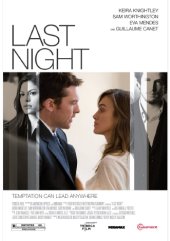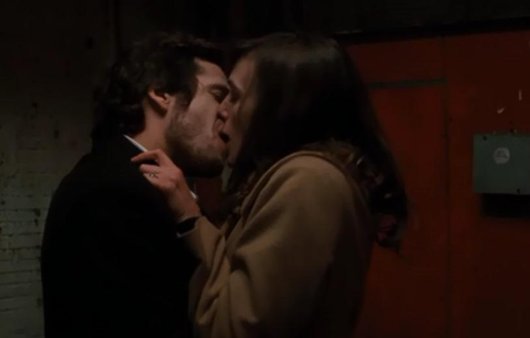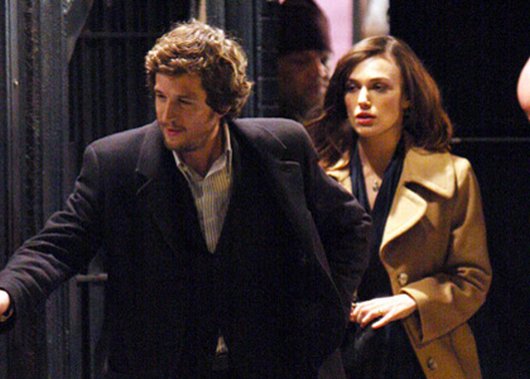 FILM
FILM In Which We Watch Her Hands For Clues
 Tuesday, June 28, 2011 at 11:54AM
Tuesday, June 28, 2011 at 11:54AM 
Cheating on Keira Knightley
by TRACY WAN
 Last Night
Last Night
dir. Massy Tadjedin
90 minutes
In many ways, Massy Tadjedin's Last Night is an exercise in how to make cheating look like the right thing to do. After all, a cast anchored by such unblemished actors — Keira Knightley, Sam Worthington, Eva Mendes and Guillaume Canet — clouds the film with a perfumed haze, leading us to contemplate their couplings agreeably, if not approvingly. There are no reinforced protagonists or antagonists, only choices amongst the beautiful.
Knightley and Worthington play a married couple - Joanna and Michael Reed - who met in college and married a few years down the line. Canet plays Alex, the guy who came in between the two stages of the Reeds' relationship; Mendes plays Laura, a designer for Michael's real estate development projects, and an attractive wedge in their otherwise quotidian marriage. The film centers around the various shades of cheating that arise when husband and wife are separated by a business trip, and both parties are confronted with an excess of desire.
Exploring a theme painfully common to relationship-oriented dramas, a film on infidelity often finds tropes hard to eschew. Secretive, erotic, unnecessarily elaborate — to our relief, Last Night is none of these things. It's straightforward, simple and, although predictable, surprisingly insightful. Most notably, it's — to the extent that still allows for unfaithfulness — honest.

Joanna dissects the impossibility of a relationship with Alex: "Oh, what I wouldn’t give to tire of you." She is frank in ways that are almost cruel; the film is stitched with these moments of disclosure. The characters’ respective bearings give depth to the otherwise routine plot. Instead of exploring the infidelity landscape, Tadjedin opts for a macro lens, a study of the minutiae. This sense of privacy, like the kind of bond forged after a confession, incites our empathy.
Last Night operates upon this surplus of information: although the four main characters are all astute, earnest and admirably introspective, they are also overdetermined. If happiness is not to exclude temptation, honesty does not prescribe morality. Being earnest does not mean knowing what to do with that honesty, if the choice is yours at all. Their frankness means unfaithfulness is discussed and resisted before being consciously and deliberately carried out. Last Night reveals the often-eclipsed ramifications of infidelity: awareness, acknowledgement, history, isolation, circumstance. Nothing is disavowed.

A film so visually interested by the personalized gestures between individuals certainly does not fail to utilize them as delineations as well. There are many complementary shades of affection in this movie: the almost-had-you embrace and the almost-lost-you reconciliation; the contemplative bleariness of guilt, and that of love's loss. Her guilt is manifested in the nervousness of her hands; his guilt is revealed by his taciturn responses.
The love between Joanna and Michael is a love that has aged into a refined rapport, an understanding of each other’s motivations no longer requiring demonstration. Much of their relationship has been internalized, and as such, there is ritualistic intimacy in everything: brushing teeth, snacking at midnight, taking the time to say "I love you." He intuits her silences as his own shortcoming. She reminds herself not to forgive easily. Their impulsions towards each other, as with gravity, have reached weightlessness.

No two bodies respond to each other with the same motions, and Joanna's relationships are no different. Her relationship with Michael exists in its own affective dimension, as does her relationship with Alex — with few overlaps.
She is aware of the polarity of her relationships, if not grateful for its perpetuation; it invites multiplicity, an alternative reality. Despite condemning Michael for craving novelty, she adorns herself in his absence: for Alex, she puts on lipstick, moisturizes, dons a pair of heels.

As that alternative, Alex and Joanna share an intimacy that is equally enviable, something that the director portrays beautifully. They have retained the cuteness of a new couple: the compulsion to smile, the inability to keep your hands off each other.
Alex knows Joanna through states of retrospective permanence: fixed addresses, memorized phone numbers, the writer's propensity for coffee in the morning. The frames of their relationship, developed in sparse windows of time across years — an e-mail here, a party there — are welded to nostalgia. Their affection is most salient through reminiscence; after all, memory has always been a trigger for dormant desire. She tells him that their love is "something that doesn't change", something to hold on to. It doesn't lessen, doesn't become diaphanous with time. But how could it? There is no escape: a photograph kept in the dark barely fades.
 the director with her stars
the director with her stars
What Last Night exposes is not a series of acts of infidelity, but the rueful choices of individuals plagued with another reality, what Joanna astutely calls "the in-between", the episodes in which one can live outside of oneself. Its sadness lies in the inability of these characters to be content with a singular possibility, to put their decisions to bed and lie in it, unclothed, undisturbed.
As a result, the sting of Joanna and Alex’s night together is soothed by its own tenderness; the carnal grace of Michael and Laura's night is obstructed by his guilt.

There are instances of this life that we will into being, and those that materialize as consequence. As Joanne acutely confesses to Alex, "I don’t know that this would be what it is on its own." And really, what is? Her word is true of this and all stories, and all that we do. What we wouldn’t give to tire of the impossible, to accept the future without referencing the past, to be contented with the everyday without the unexpected to punctuate it? But we can't: we need absence to be sure of presence. Love only exists in comparison.
Tracy Wan is a contributor to This Recording. She is a writer living in Montreal. This is her first appearance in these pages. She tumbls here.

"Green Grass" - Tom Waits (mp3)
"Motel Blues" - Bombay Bicycle Club (mp3)
"Modern, Normal" - Memoryhouse (mp3)





















































